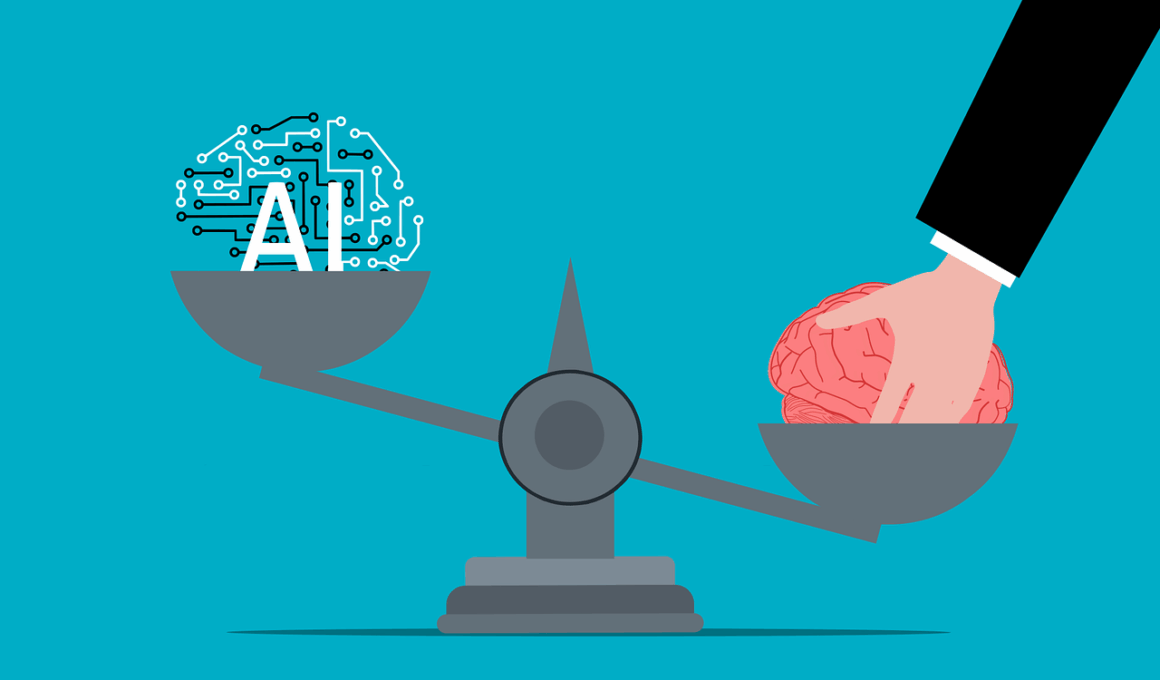Artificial Intelligence Ethics in Business Innovation Practices
In today’s rapidly evolving marketplace, the integration of artificial intelligence (AI) into business innovation practices is revolutionary. Businesses leverage AI for enhancing operational efficiency plus delivering superior customer experiences. However, this technological advancement necessitates a robust ethical framework to address potential risks associated with its application. Ethics in AI is essential as it encompasses transparency, accountability, and fairness, which influence business decisions and operations. Companies must recognize that deploying AI comes with social responsibilities. Addressing bias in algorithms, protecting consumer privacy, and ensuring data security are critical components of ethical AI usage. Thus, developing AI responsibly plays a vital role in shaping consumer trust. Incorporating ethical considerations into business innovation not just fosters a positive brand image but also enhances competitiveness in a crowded market. When businesses prioritize ethical AI practices, they are likely to cultivate sustainable relationships with stakeholders while adhering to regulations. Overall, the continuous evaluation of AI applications is essential for responsible innovation. By drawing clear ethical boundaries, businesses can promote innovative growth while safeguarding the interests of consumers and society as a whole. The synergy of ethics and innovation leads to a more equitable technological landscape overall.
As businesses embrace AI technology, understanding the implications of AI ethics is critical for ensuring long-term success. This understanding bridges the gap between technological advancements and ethical responsibility, allowing organizations to employ AI consciously. Business leaders must invest in comprehensive training for employees to navigate the ethical dilemmas associated with AI deployment effectively. An AI-centric culture fosters a sense of accountability among teams in how they design, develop, and implement AI solutions. Moreover, organizations can benefit from creating ethical review boards that assess AI initiatives regularly. Such governance structures ensure alignment between innovation and ethics. Additionally, engaging with stakeholders, including customers and regulatory bodies, helps to gain valuable insights. Businesses can encourage transparency by openly discussing their AI practices and related ethical considerations. Stakeholder feedback plays an invaluable role in shaping an ethical approach to AI. Furthermore, organizations must stay informed about emerging regulations surrounding AI technology. Compliance with legal frameworks ensures that businesses mitigate risks while innovating responsibly. Being proactive in these areas enhances the organization’s ability to respond to challenges while maintaining ethical standards and fostering sustainable business innovation practices that resonate positively in society.
The Role of AI in Transforming Businesses
Artificial intelligence is increasingly transforming traditional business models through automation and data analysis. By integrating AI technologies, businesses can streamline operations, reduce costs, and gain insights to make informed decisions. This transformation introduces various ethical dilemmas that arise from algorithmic decisions and the potential for inequality. Companies must tread carefully when implementing AI solutions, ensuring that they do not inadvertently harm marginalized groups. Ethical considerations include monitoring algorithms for bias, maintaining data privacy, and ensuring transparency in AI decision-making processes. Furthermore, organizations should prioritize developing inclusive AI systems that promote diversity in hiring practices and algorithmic training datasets. Actively engaging with a diverse group of stakeholders during the design phase of AI systems allows businesses to identify biases early. Furthermore, creating a culture of ethical reflection enables ongoing assessment of AI’s impact on business practices and broader society. Ultimately, transparent communication about how AI technologies operate builds consumer trust, making businesses more resilient. The successful integration of AI into business innovation succeeds only when ethical practices guide decision-making processes. A commitment to responsible AI not only enhances brand reputation but also contributes positively to societal advancement.
A robust framework for AI ethics must also encompass regulatory compliance, which play a vital role in safeguarding public interests. Compliance with regulations not only prevents unethical practices but also reinforces a company’s credibility in the market. For instance, the General Data Protection Regulation (GDPR) sets stringent guidelines for data collection and usage. Businesses must ensure their AI implementations align with such regulations to avoid financial penalties along with reputational damage. Beyond compliance, organizations can adopt best practices that further solidify their ethical standing in AI development. For example, developing user consent protocols allows businesses to align AI applications with customer expectations and privacy concerns. Additionally, promoting inclusive technology development—where diverse teams collaborate on AI projects—contributes to reducing bias in AI systems. Proactively addressing these challenges before they escalate showcases organizational commitment to ethical standards. Forward-thinking businesses are already anticipating regulations as they work on innovating responsibly. Evaluating AI implementations continuously enhances the organization’s capacity to adapt to changing regulatory landscapes while remaining compliant. Such an approach not only mitigates risks but also propels businesses toward sustainable innovation practices that generate social value for all stakeholders.
Consumer Trust and Ethical AI
Trust is a fundamental aspect of business success, and the implementation of ethical AI directly influences consumer perceptions. When consumers perceive transparency in how businesses utilize AI, they are more likely to engage with brands. Therefore, building consumer trust requires companies to develop clear communication strategies around AI usage and its implications. Providing information on data usage, consent processes, and AI decision-making can enhance transparency and foster consumer confidence. Furthermore, organizations that prioritize accountability and responsive behavior in AI systems are more likely to foster loyalty among their customers. In the event of an AI system’s failure or error, a transparent and responsible approach to addressing such issues assures consumers that their interests are safeguarded. Additionally, companies should encourage feedback from users regarding their experiences with AI applications. Listening to consumer concerns enables organizations to refine their AI strategies continually. Engaging in open dialogues cultivates a community of trust and collaboration. By embracing ethical AI practices, organizations signal their commitment to placing consumers at the center of innovation. Ultimately, this paves the way for long-term relationship building, fostering brand loyalty and advocacy in a competitive marketplace.
Furthermore, the adoption of ethical AI practices can result in significant competitive advantages for businesses committed to responsible innovation. Companies that prioritize ethics not only safeguard their reputation but also appeal to consumers increasingly concerned about ethical implications. Today’s consumers actively seek brands that align with their values. This trend underscores the importance of ethical considerations in product development and marketing strategies. Utilizing ethical AI practices allows businesses to differentiate themselves from competitors by creating innovative offerings driven by values. Moreover, organizations seen as ethical gain employee trust and motivation, fostering a positive work environment throughout the workforce. Employees are more likely to feel a sense of pride in working for a socially responsible organization, ultimately enhancing productivity and creativity. As these organizations innovate responsibly, they attract top talent that prioritizes ethics in their work environment. By investing in ethical AI practices, organizations position themselves as thought leaders in responsible technology. This leadership attracts partnerships with similarly-minded enterprises, creating further opportunities for collaboration and innovation. The synergy of ethical considerations and technology opens new avenues for positive impact and business growth, propelling market forces toward sustainability and shared value creation for all stakeholders involved.
The Future of Ethical AI in Business Innovation
The future of business innovation will increasingly revolve around the ethical considerations associated with emerging technologies, particularly AI. As AI continues to evolve, organizations must remain vigilant about the ethical implications that accompany these advancements. This responsibility extends to continuous education about AI technologies along with their societal effects. Businesses that invest in understanding the broader landscape will reap the benefits of ethical AI integration. Engaging in ongoing discussions regarding ethical dilemmas ensures that companies remain ahead of the curve in ethical AI implementations. This proactive stance enhances their ability to navigate complex regulatory landscapes while fulfilling social responsibilities. Furthermore, organizations should focus on incorporating ethics into the very fabric of innovation strategies. By embedding ethical frameworks into corporate cultures, businesses can promote ethical decision-making long term. The successful integration of AI technologies in business hinges on fostering environments that prioritize ethics, innovation, and social value. With growing public demand for ethical practices, businesses have the unique opportunity to lead by example by championing ethical AI initiatives. This leadership will undoubtedly shape the discourse around AI and drive positive change within industries. Overall, the intertwining of ethics and innovation is essential for building a sustainable future.
As the convergence of AI and business innovation continues to redefine the marketplace, it brings forth intricate challenges and opportunities. The ethical considerations embedded in AI applications are pivotal in fostering consumer trust while ensuring regulatory compliance. Businesses must recognize that the world is transitioning toward an era where ethical AI will differentiate leaders from followers. By prioritizing ethical strategies, organizations position themselves for sustainable growth while addressing moral concerns. Engaging stakeholders throughout the innovation process not only enhances accountability but creates a collaborative approach to ethical challenges. Actionable insights derived from stakeholder feedback can significantly influence how products and services are perceived. Furthermore, organizations must leverage technology to facilitate transparency, showing consumers how AI systems operate and how they safeguard user data. Coupling transparency with ethical guidelines can create a robust framework for operational integrity. In addition, investing in community initiatives related to AI ethics will inform broader societal dialogues while demonstrating a commitment to responsible business practices. The collaboration between businesses, policy-makers, and technology leaders will intensify as the AI landscape evolves. This collaborative effort is crucial for establishing standards that govern ethical AI use while fostering innovation that benefits all facets of society.





